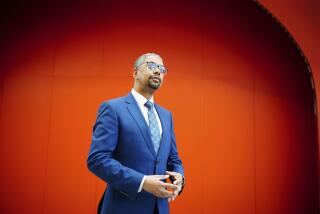Hopes of Glory Galvanize British Laborites
- Share via
BLACKPOOL, England — Each year, millions of British vacationers flock to this blue-collar seaside resort renowned for gaudy street lights, an Eiffel-like steel tower and plastic bowler hats beribboned with the invitation “Kiss me quick.”
None has come in a better mood or with higher expectations than Anthony Charles Lynton Blair.
Odds-on favorite to be Britain’s next prime minister as an election season opens, Tony Blair dominated a hallmark Labor Party conference here last week, a figure as incandescent--and as improbable--as the miles of seashore lights known across England as “the illuminations.”
A silver-spooned, Oxford-educated lawyer who has yanked a calloused, fractious workers party toward the political center, Blair lighted up Labor’s annual meeting in a Victorian dance hall with the exhilarating prospect of winning power for the first time in nearly two decades.
Far ahead of Prime Minister John Major in opinion polls, Blair has silenced the internal differences, repainted the image and softened the sharp edges of a proud socialist party in a democracy where class lines are blurring and capitalism is no longer a dirty word.
“Labor’s coming home,” Blair promised in a battle cry that will echo across Britain in a fight against Major and a Conservative Party dogged by fatigue and scandal after more than 17 years in power. It is up to Major to schedule the election by next spring.
For the looming battle, Blair, 43, has built what he calls “new Labor” with skill, patience and a liberal dose of American campaign techniques, from pollsters and spin doctors to platform theatrics, carefully weighed rhetoric and go-get-’em videos.
In an hourlong conference address in which Blair delivered a British answer to the Republicans’ “contract with America,” the candidate pirouetted on stage and embraced his wife, Cherie, also a lawyer, while pounding bass from the music of the Pet Shop Boys fueled a 10-minute standing ovation.
Reaching beyond working-class supporters to woo voters traditionally chary of Labor’s socialist principles and tax-and-spend history, Blair has fashioned a gamut of motherhood-and-apple-pie policies. They were writ large on the wall behind him as he spoke: “Tough on crime, more jobs for the young, strong economy, smaller [school] classes, shorter waiting lists [for free health services].”
“Ask me my three main priorities for government,” he said, “I tell you: education, education and education.”
*
Making 10 “vows” to Britain, Blair promised to hold the line on taxes, to improve the health, education and justice systems, to create regional governments for Scotland and Wales, and to improve Britain’s relations with Europe.
“Today I offer you, and we offer the country, a new vision. . . . A society of opportunity. A society of responsibility. . . . History will call it ‘The Decent Society,’ a new social order for the age of achievement in Britain.”
Blair won his loudest applause with a single sentence: “I believe we should ban the private ownership and possession of handguns.” That is not a radical proposition in a nation where most police don’t carry guns and even Major’s Conservatives govern to the left of President Clinton on social issues.
Everybody in Britain thinks the welfare state should work better. But no major party questions the wisdom of a society in which medical care is free, housing is widely subsidized and free social services are abundantly available.
Making their conference look more than ever like an American political convention (without balloons) is a singular innovation for Labor, a feisty party in which positions are strongly held and fiercely defended.
The annual party conference is a standby of British politics, beginning in the second week of September and ending in October. Labor conferences have often been forums filled with political fire and thunder. In the age of ideology, differences sometimes spilled from the conference platform to fistfights in neighborhood pubs. This year, naysayers held their peace. Why rock the boat when victory seems so near?
*
Behind his yuppie smile, Blair is a tough leader with little patience for dissent. Critics within the party and without sometimes portray him as a dictator.
At the conference, while dissidents were cajoled to silence, Blair’s something-for-everyone keynote address contained “precious little socialism,” said Boris Johnson in the conservative Daily Telegraph.
“Tony Blair has made it clear that we are not in anybody’s pocket,” said Peter Hain, a member of Parliament who speaks for Labor on employment matters. “This conference has all the feeling of preparing for government. We are determined not to let this one slip away.”
Labor Party leaders are already conferring with key civil servants in government ministries to explain policies they hope to implement once in power.
Despite a historical link between Labor and British labor unions, Blair has cracked down on union leaders who object to policies they think undermine traditional socialist positions.
John Cogger, president of the national railway workers union, an old-line leftist who favors renationalizing the railroads, was not allowed to address the conference.
“We’re excluded, but we’re better off in the party than out of it,” Cogger said. “It’s a broad church, and I have to admit that there are more people on Blair’s side of the aisle than on mine.”
Seeking the broadest possible support, Blair has gone out of his way to woo business leaders--long-standing management enemies of unions.
This year, for the first time, a national association of company directors had a booth at a Labor Party conference. Delegates still call one another “comrade,” but Blair prefers “colleague.”
Blair won wide acclaim for his conference speech, but not everybody was impressed. Analyst Matthew Parris proclaimed himself “underwhelmed by that Billy Graham tone in the speech . . . the faintly messianic ring.”
Scotsman Tam Dalyell, who has served the Labor Party for 34 years in Parliament, disliked the manicured air of Blair’s Labor. “Party conferences used to be about policy. Now it’s showmanship,” he complained.
As Major rallies his forces for a counterattack at the Conservative conference this week in Bournemouth, another seaside resort, Blair has achieved what young supporters in his “new Labor” welcome as a sea change.
“The party has modernized itself without shedding principles. We have learned to talk in a way people understand,” said Angela Eagle, a 36-year-old Labor lawmaker.
More to Read
Get the L.A. Times Politics newsletter
Deeply reported insights into legislation, politics and policy from Sacramento, Washington and beyond. In your inbox twice per week.
You may occasionally receive promotional content from the Los Angeles Times.










